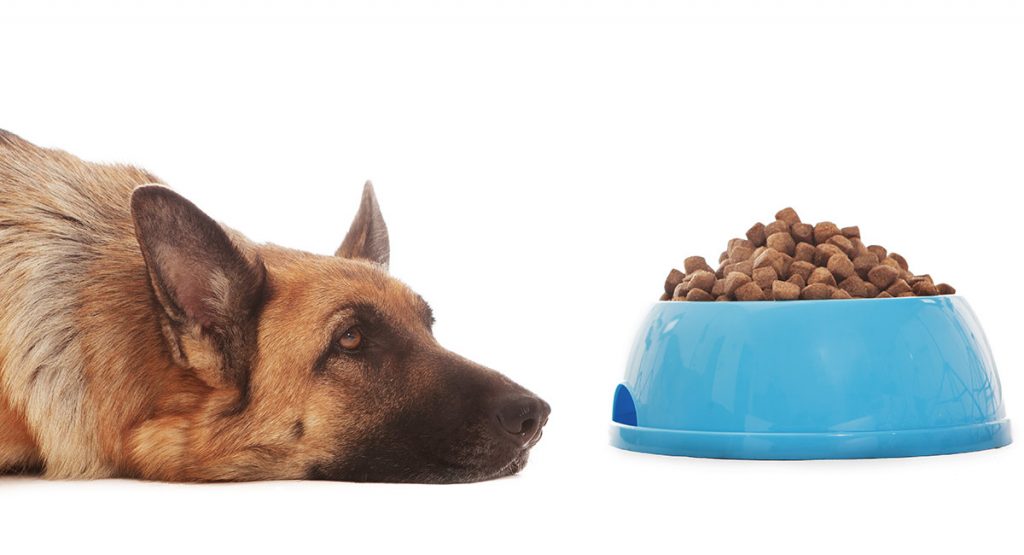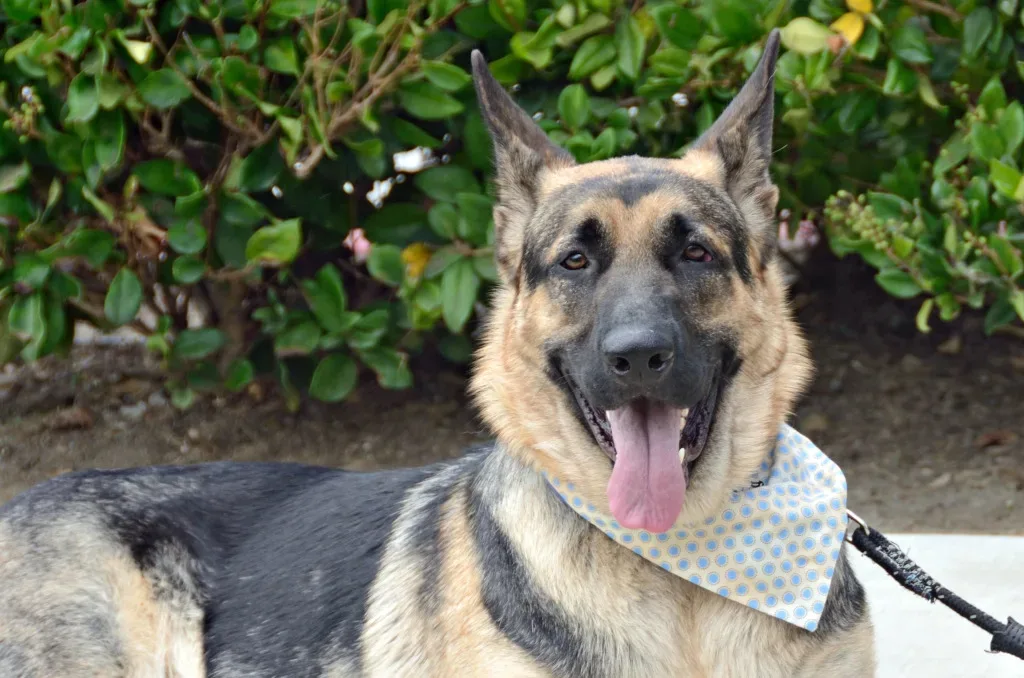German Shepherd Allergies are quite common, this may come as a surprise to many people, even dogs are prone to allergic reactions. This is more common than you think.
Table of Contents
What kind of allergies do German shepherds develop? What symptoms do they show and how to control their allergy?
One in seven dogs suffers from one type of allergy or the other has common allergies. As in humans, allergies in dogs occur when the immune system is exposed to a daily substance similar to certain pollen or food.
The best way to care for a German Shepherd with allergies is to avoid irritation completely. Understanding how your dog responds to certain allergens is the first step.
Most Common German Shepherd Allergies
Flea Allergy
This allergy is most common in German shepherds. In most cases, dogs are allergic to flies.
If not, persistent itching and red spots may result from a flea bite. Even after just one bite from a flea, irritated skin is developed by German shepherds with flea allergies.
The best way to treat this problem is to have flea control over your GSD and his surroundings at home. Antihistamines and steroids can help you reduce itching.
Grain Allergy
Grain allergy is very common in dogs. That’s why you see so many grain-free kibble products on the market today. In the past, grains were used to keep costs low. Cheaper brands still use them as a compliment.
The truth is, those grains are not necessary. Corn, wheat, and soy are the worst offenders. Those ingredients do nothing to help your dog out of food. In fact, most dogs have trouble digesting them.
There are plenty of grain-free dog food products these days, so you should have no trouble finding what your dog likes. Be sure to read the list of ingredients.
Food Allergy
Food allergies are more common in German Shepherds than in many other breeds. These allergies also come through itchy skin.
If the skin of your GSD is infected when he has no flies, it is caused by a food allergy. Other symptoms such as chronic diarrhea and abdominal pain.

Allergy with Chicken
German Shepherd dogs are frequently allergic to chicken, which can be attributed to the high protein content of this popular ingredient.
It’s been observed that German Shepherds can develop an allergy to a variety of animal proteins, such as chicken, beef, milk, fish, eggs, and lamb. This is due to specific proteins present in these foods that can be difficult for some dogs to digest, resulting in an immune response that triggers allergic reactions.
The German Shepherd breed of dogs can experience an adverse reaction to chicken. This allergic reaction has been observed while serving chicken for a week.
The indications of chicken allergies in dogs can vary significantly from one canine to the next. Certain dogs may exhibit issues with their digestive system or develop skin allergies, whereas other dogs may present respiratory symptoms.
If you are looking for the best dog food for German Shepherds who suffer from skin allergies, you may find it difficult to choose. However, by doing your research, you can find the right food to help soothe your dog’s skin and keep them healthy. In this blog post, we will explore some of the top dog food options for German Shepherds with skin allergies, allowing you to make an informed decision.
To decrease the likelihood of chicken allergies in German Shepherds, it is recommended that you take the following steps:
- Avoid feeding chicken-based foods to your German Shepherd.
- Switch to a hypoallergenic diet that does not contain chicken or other animal proteins.
- Be careful when giving treats as many of them may contain chicken offal.
The most common symptoms of an allergic reaction to chicken in German Shepherds are:
- itchy skin
- Hives or rash on the face, stomach, and/or feet
- skin redness and irritation
- diarrhea
- Vomit
- coughing and wheezing
To maintain the health of your German Shepherd, it is recommended that chicken-based food be avoided.
Transitioning to a diet that is hypoallergenic and devoid of chicken and other animal proteins is recommended.
Allergy with Beef
Unfortunately, German Shepherds can also be allergic to beef. After research, PMC experts came to surprising results.
“The most common food allergen associated with CAFR in dogs was beef (102 dogs, 34%).”
Some German Shepherds may be allergic to beef because beef contains proteins that the dog’s immune system may interpret as foreign and harmful, triggering an allergic reaction. This is called IgE-mediated food allergy, an immune response that causes inflammation and other symptoms such as itching, coughing, and swelling.
Pollen allergies
Pollen allergies are very rare in the dog world. Unfortunately, pollen is one of the most influential species of German Shepherds. Pollen allergens are genetic, so it goes through many generations.
Also Read: How much Exercise does a German Shepherd Need?
Pollen is an airborne material produced by trees. When a German Shepherd inhales it, the immune system blames it for a serious threat.
This can cause red itchy skin, runny nose, and other ailments.
Allergies can also cause atopic dermatitis. This is a chronic condition that can flare up periodically whenever your dog is exposed to pollen. Unfortunately, there is no cure for this condition.
However, you can work with your vet to keep fires under control. Supplements and medications can help reduce symptoms and provide some relief.
Allergy with Dust
Inhalation of dust can cause atopic dermatitis in dogs. In general, dust mites and dirt particles in the air are the worst. It can also cause breathing difficulties, rashes, and asthma.
Dust is a must, but you can do your part to limit your dog’s exposure. Keep your home clean and keep your puppies away from dirty areas in your home.
Also Read: Black German Shepherd Golden Retriever Mix so-called Golden Shepherd Mix
Mold Allergy
Mold is a fungus that occurs both indoors and outdoors and may cause allergic reactions in some dogs, especially German Shepherds. Mold spores are often inhaled by dogs, which can trigger allergic reactions.
German Shepherds can develop mold allergies. This is similar to pollen or dust allergies. The dog’s immune system fights to prevent mold spores whenever they inhale them.
Excessive scratching, inflamed skin, loss of appetite, and vomiting are the most common symptoms. The problem with mold is that you don’t always see it. Mold grows in moist and dark places.
Allergic Symptoms in German Shepherds
German Shepherds usually develop symptoms that affect their skin when exposed to any allergens. These features include; Itching, rash, hot spots, redness, and bald spots from scratching. Allergens can be anything: certain foods, flea bites, chemical irritations (found in the shampoos or chemical products you use in your GSD). In the advanced stages, infections appear as a result of excessive scratching that breaks down the skin. Signs of infection include discharge, swelling, odor, and increased redness.
Warning signs of allergy
- Hair loss
- Diarrhea
- Frequent laughing, scratching, chewing
- Flaky and red skin
- Hives
- Swelling of the face, ears, lips, eyelids, or earlobes
- Vomiting
- Sneeze
- Itching in the ears
- Chronic ear infection
- Itching, runny nose
How can you diagnose a skin allergy?
Irritation on reddened skin. The skin also swells in some parts, but this is usually caused by a bump or scratch. Allergies can sometimes cause rashes that have small “papules” on the skin.
If your dog develops an ear infection or begins to lose hair, allergies are more likely to persist, leading to atopic dermatitis.
Other symptoms that indicate a skin allergy are frequent coughing, constant picking of the belly and feet, and massaging the face.
Diagnosis of Allergies in German Shepherds
The identification of allergies in German Shepherds can be a complex process. It involves a thorough examination of the dog’s clinical history, dietary habits, and environmental exposure. Symptoms such as itching, redness, and inflammation of the skin, as well as gastrointestinal distress, may indicate an allergic reaction.
Diagnostic tools such as intradermal skin testing, blood tests for specific immunoglobulin E, and elimination diets may be used to confirm the presence of an allergy. It is important for dog owners to be vigilant and seek veterinary care promptly to manage allergies and prevent potential complications.
In the event that you suspect that your German Shepherd may be experiencing an allergy, it is imperative that you seek veterinary assistance without delay. Initially, the symptoms of an allergic response in K9s may be somewhat mild, but they can worsen as time passes.
Furthermore, the symptoms exhibited during an allergic response can be extremely unpleasant for your German Shepherd and may result in enduring problems such as hair loss, weight loss, or thickening of the skin.
If your pet is displaying signs of an allergic reaction, your veterinary professional may suggest that you undergo diagnostic testing. These tests could include blood tests, saliva tests, or skin allergen testing. They may also suggest elimination trials, especially if it seems that your pet may be experiencing an allergic reaction to their food.
When conducting elimination trials with your German Shepherd, it is necessary to feed them a singular variety of food for a duration of 8 to 12 weeks.
Once your dog’s symptoms have resolved, you have the option to either sustain this diet or gradually reintroduce various food types to determine which one caused the allergic reaction.
Identifying the specific trigger of an allergic reaction can be a challenging and sometimes unfeasible task, despite thorough testing. In such circumstances, the focus of treatment will be on alleviating the symptoms of the allergic response.

